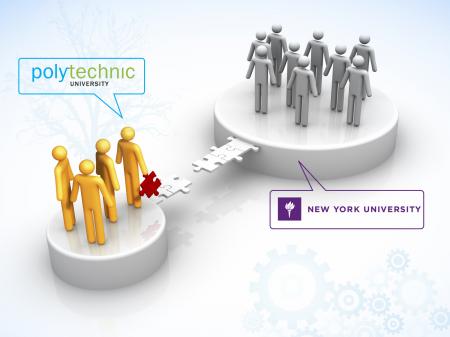Merging of the Minds: first group of Poly students takes classes at NYU
 |
A group of intrepid Poly students has taken a glimpse at the future of Poly as a school of NYU and reports that there’s much to look forward to.
Late last year as merger planning was at full tilt, nine students got to select any open course at NYU that they wanted to take. Their choices ranged from abstract algebra to human evolution to cognition.
The students are part of a pilot Poly-NYU program conceived as a way to uncover potential logistical problems involved with Poly students taking classes at NYU. Overall, things like getting IDs and registering for classes have gone smoothly.
What the program has really uncovered is a snapshot of how the Poly-NYU partnership will affect students’ academic plans – and, of course, their post-academic futures.
The expectations and realities of class life
Before the first day of his human evolution class, Valentin Siderskiy, an electrical engineering junior, did some homework on the class’ professor. Valentin discovered that she is a well-known leader in the field, which added to the question that most of the Poly students in the pilot program asked themselves: Is NYU going to be harder than Poly?
This is a significant question. It’s also an inevitable one when one – as many do – looks at academic institutions through the lens of tiers and rankings.
When interviewed for this story, nearly all five of the students who shared their insights had taken midterms or submitted midterm assignments. They all said they were happy with their performances and in many cases felt that they were doing as well as or better than their classmates, putting to rest their initial concerns.
Facing new challenges
Some students did speak about challenges their courses presented that took them out of their comfort zones.
For example, Eran Geva, a junior in the bimolecular sciences B.S.M.S. program, who is taking cognition to fulfill his psychology minor, says that the course is quicker paced than similar courses he’s taken at Poly. There are also 200 students in the class, a figure not uncommon to universities of NYU’s size, but foreign to Poly.
The pace and size are demanding and require more self-discipline. But, Eran says “it’s worth every minute” and describes the environment as “vibrant.”
Lamia Iftekar, an electrical engineering junior who’s also working on a psychology minor, has experienced what may be one of the more difficult challenges that will face Poly students who take humanities classes at NYU: debate.
“The discussions can be heated,” says Lamia of her industrial and organizational psychology course where topics such as gender discrimination in the workplace fill most of the class meetings. Lamia is comfortable contributing her thoughts to the discussions, but thinks some of her Poly peers might find it difficult to do the same. “We’re not used to discussing concepts that are open to debate,” she says. “We’re used to set concepts like in math.”
While Poly students may not be accustomed to the shades of gray that come up in many humanities classes, their firm foundation in math is sure to be an asset. More than one student shared an anecdote of a professor asking his/her class for an answer to a fairly simple statistics-related question to a room of blank faces. “We’re expected to be able to do math in our heads,” said one student who was a bit amused to see that the reliance on calculators for even simple computations is commonplace, a trend not at all unique to NYU.
Benefits beyond and outside the classroom
Many merger discussions and articles have predicted that some of the biggest benefits to being a school of NYU will be found outside of the classroom. The pilot program students have found that to be true, especially the online research database.
Srinivasa Chemudupati, a junior, explains: “Most of the articles and papers I need are either in Nature or Physical Review Letters to which I never had access to [at Poly] unless I went and requested from a professor. Now I can read whatever I want to without bothering anyone, which is always a good thing.”
And what about the prospect of having an NYU diploma? The group was split. Robert Fisher, a senior, thinks the benefits depend on a student’s immediate post-graduation plans. For him, that’s graduate school, which he sees as being more dependant on strong recommendations. For others, the name recognition of NYU is hugely important, especially when meeting or networking with people abroad or outside of the science and technology fields.
There’s one thing that all of the students who contributed to this article agree on: the opportunity to take classes at NYU is a chance in an academic lifetime. And while the campus is larger and the resources are more plentiful, as one put it “college students are college students” and as another concluded, “there are only good things to come.”




